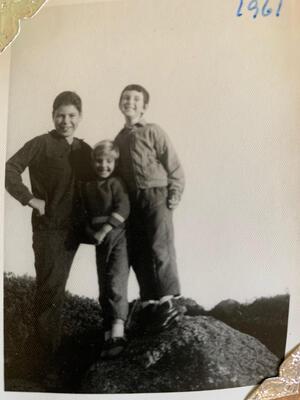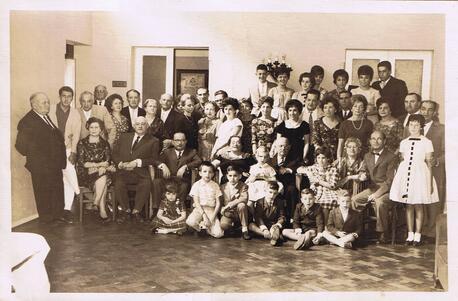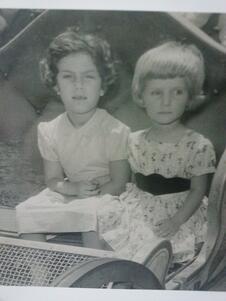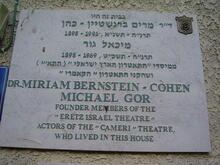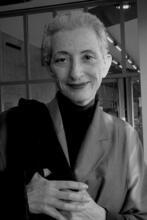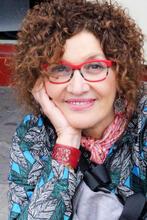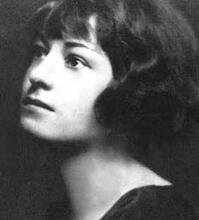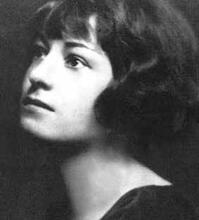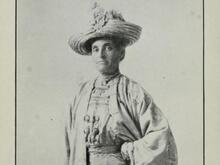Marjorie Agosín
Marjorie Agosín was an award-winning Chilean Jewish poet, memoirist, novelist, literary critic, editor, educator, and human rights activist, and a renowned professor of Spanish and Latin American Studies at Wellesley College. One of the most important and prolific Latin American woman writers of her generation, she wrote in Spanish and chose to live in translation in the English-speaking world. Horrified by the plight of the “disappeared” in Chile following the Pinochet takeover, she became an outspoken defender of human rights, especially on behalf of women and children. Agosín moved fluidly between Chile, Europe, and the United States in her life and her writing, making transnational flows of memory come alive in her vibrant poems and stories.
Family and Education
Born in Bethesda, Maryland, in 1955, Marjorie Agosín grew up in Chile, where she returned three months later with her Jewish Chilean parents, Moisés Agosín and Frida Halpern, to live amid their extended Jewish family in Santiago and in Quisco, a village near Isla Negra, where Pablo Neruda once resided. Agosín, together with her sister, Cynthia (b. 1952) and younger brother, Mario (b. 1963), spent her childhood and early adolescence in Chile in the 1960s, studying at the Hebrew Institute of Santiago de Chile. As she put it in her memoir, The Alphabet in My Hands, the school was established in the 1920s “so that the Jewish children of Chile would be spared shouts of ‘Jewish shit’ and questions about their horns.” In that school, her history teacher, Doña Marta Alvarado, taught her, “Real history was made by women,” a statement Agosín would take to heart in her future work.
Much as Agosín always loved Chile, and she returned often, she acknowledged the anti-Semitism that took root in her home country, spurred by German colonists encouraged to settle in southern Chile, as well as Nazi war criminals who arrived after World War II. She addressed this subject in detail in her haunting memoir, A Cross and a Star: Memoirs of a Jewish Girl in Chile, where she shared the stories of her Russian, Polish, and Viennese Jewish ancestors, who fled the pogroms of Czarist Russia and Nazi extermination camps and found their way to Chile on the eve and at the start of World War II, carrying with them what Agosín calls “the Shoah to come.” In Chile, sadly, they discovered that the anti-Semitism they attempted to flee followed them to their new home.
In 1972, Agosín moved with her family to Athens, Georgia. Her father, a doctor and a biochemist, took a job as a professor of chemistry at the university, not realizing how long they would be staying. The following year, Augusto Pinochet staged a military coup, overthrowing the democratic government of Salvador Allende, and the family knew they could not return.
Living in exile was painful for Agosín. She felt out of place in Georgia, where she had to continually explain her identity during her high school years to people who could not understand how she could be blonde, speak Spanish without looking Latina, and also be Jewish. She also never felt completely comfortable in the American Jewish community. As Agosín noted, “Jews in North America are not very much like me. They are Jewish North Americans. Their America belongs to them. We Jews in Latin America remain always grateful for the ports of entry opened to us, yet underneath the bed we always keep a suitcase” (The Alphabet in my Hands, 33).
Agosín received her B.A. from the University of Georgia in 1976. She then obtained her PhD in Latin American Literature from Indiana University in Bloomington in 1982. Her first academic position was at Wellesley College, where she taught beginning in 1982, offering courses on Jewish women writers and on Latin America, as well as creative writing classes. Agosín lived in Wellesley, where she received the Andrew Mellon Professorship in the Humanities, with her husband, nuclear scientist John Wiggins (m. 1977), and they had a son, Joseph (b. 1988), and a daughter, Sonia (b. 1991).
Professional Contributions
In her many impressive roles as a poet, storyteller, editor, scholar, educator, and activist in the field of human rights and women's rights, Agosín showed herself to be an accomplished creative writer as well as a profound thinker and a woman of integrity, passion, and intellectual brilliance. With her ability to combine creative and critical work and to speak to a wide range of audiences in the world of humanistic scholarship and the creative arts, Agosín made major professional contributions, always connecting her love for the Spanish language with her Jewish identity.
Agosín was an unusual Latina and Jewish writer in that she wrote in Spanish, a sacred language of home for her. Her work was always translated into English for North American readers and she chose thereby to live in translation. Agosín inhabited several places, fluidly moving between Chile, Europe, and the United States in her life and her writing, making transnational flows of memory come alive in her vibrant poems and stories.
Agosín received many awards for her creative work, including the Gabriela Mistral Medal of Honor for Life Achievement by the Chilean government. Horrified by the plight of the “disappeared” in Chile following the Pinochet takeover, Agosín became an outspoken defender of human rights, especially on behalf of women and children. She was recognized for her lifelong activism with a rare and prestigious Leadership Award in Human Rights from the United Nations, and she also received the Fritz Reidlich Award for Human Rights from the Harvard Program on Refugees and Trauma.
Poetry and Short Stories
Agosín's many books of poetry, among them Zones of Pain and Other Poems, Dear Anne Frank, and Noche Estrellada, explore the themes of memory, history, trauma, violence, and exile through a sensibility that is attuned to the musical rhythms of poetic language and the philosophical depth of poetic reflection.
The important collection of her poems, At the Threshold of Memory: Selected and New Poems, showcases the multiple registers in which Agosín can write, remembering Anne Frank in her poem “Amsterdam,” with the words, “I am Anne Frank/I am thirteen years old/but I am also thousands of years old./I smell of smoke and old age/covering the faces of fear” (p. 95). And in a poem called “Alien,” she describes a foreign woman, perhaps much like herself, “making a map,/geographies,/tattoos of her/sorrows” (p. 129).
In her bilingual poetry book, The White Islands/Las islas blancas, inspired by her journey to Salonika, the Greek Islands, Rhodes, Crete, as well as the Balkans, Agosín moves in a new direction, offering a lament about the expulsion of the Descendants of the Jews who lived in Spain and Portugal before the explusion of 1492; primarily Jews of N. Africa, Italy, the Middle East and the Balkans.Sephardic Jews from Spain as seen through the eyes and stories of Sephardi women past and present. Agosín also tells the often-forgotten story of the Greek Jews who perished in the Holocaust. As she writes, “They took all the Jews of Rhodes/On a sunny day like all of the gentle days of the Aegean Sea” (p. 57).
Agosín’s short stories, such as the collection Happiness, have a richness of voice that make them sing on the page, even as she describes feelings of loss and estrangement and examines the plight of marginalized women. Agosín also brings her poetic wisdom to bear on difficult political issues; her book, Ashes of Revolt: Essays on Human Rights, stands out as a singular example of a poet addressing troubling problems of our time.
Memoirs
Agosín’s vast body of work in the realm of memoir, essays, and fiction weaves together Jewish and Latin American culture and history and explores the secrets, silences, and broken memories that elusively gather the generations in her family in a transnational flow that connects Europe, Chile, and the United States. She explores the complex links between the European intolerance and anti-Semitism that led to her family's immigration to Chile and the rise of the political repression in Chile that led to her family's subsequent immigration to the United States.
Her memoirs, A Cross and a Star: Memoirs of a Jewish Girl in Chile and Always from Somewhere Else: My Jewish Father, are unique accounts of the life stories of her mother and father that express the crucial importance of bearing witness to those stories while weaving them within the larger history of Jewish diaspora displacements and search for home in the modern era. Together, these memoirs offer a moving window onto the history of Jews in Chile. The memoirs are told in fragments that grow through a layering process that mirrors the ebb and flow of memory. Agosín's poetic method is that of an archaeologist seeking catharsis, trying to get at the many layers of losses and longings of Jews, like her parents, who made their América on the other side of the border and became “Latin Americans,” only to have to remake themselves again as "Latinos" in the America of the United States.
Anthologies
In addition to her extensive and accomplished writing in many literary genres, Agosín played a key role as a critic and editor, single-handedly bringing a wide range of Latin American Jewish and Latina Jewish women's writing to the attention of North American and global readers through the many anthologies she has edited. Agosín was an essential voice in the effort to redefine Latina/Latin American identity in ways that challenge stereotypes and simplistic constructions of history. She brought out an impressive number of anthologies of Latin American Jewish women poets and writers, in English, Spanish, and in bilingual editions.
Among these anthologies, The House of Memory: Jewish Stories from Jewish Women of Latin America, was the first anthology of Latin American Jewish women's writing to be published in the United States, and Agosín’s two major collections, These Are Not Sweet Girls: 20th Century Latin American Women Poets and Landscapes of a New Land: Short Stories by Latin American Women Writers, offer a thorough general introduction in English to the spectacular poetry and fiction writing of contemporary Latin American women writers.
In the anthology, Home: An Imagined Landscape, Agosín expanded her geographic map to include writers from a range of nations, including Jamaica, Egypt, Greece, and Hungary, seeking a broad understanding of the nomadism and global immigration of our time. As Agosín so beautifully put it in her introduction to this volume, “Home is an ever-traveling ship that arrives yet also takes sail in the harbors of our imagination” (p. xv).
Young Adult Fiction
After a long and successful career writing in a wide variety of genres for adult readers, Agosín plunged into young people’s literature, producing the young adult novel, I Lived on Butterfly Hill, which won the Pura Belpré Medal for a work by a Latina/Latino author that celebrates Latina/Latino identity, an award given by the American Library Association. Through the eyes of the protagonist, Celeste Marconi, Agosín tells the story of an eleven-year-old Chilean girl sent to Maine by her parents to protect her as the Pinochet government proceeds to “disappear” those considered subversive. Her sequel to this novel, The Maps of Memory: Return to Butterfly Hill, follows Celeste Marconi on her return to Chile after the end of the Pinochet dictatorship, where she learns of the suffering inflicted upon family and friends. Through these two books for young people, Agosín took on the difficult subject of political trauma as it affects youth trying to make sense of the past and the present. Written with her customary lyricism, clarity, and ethical commitment, the works bring Agosín’s vast knowledge and understanding of questions of memory and loss, and the scars that history and politics leave on the soul, to a new generation. This new dimension of her work passed on these stories to young people, so they can create a more just world where human rights can truly exist for all.
Jewish Identity
Agosín was immensely spiritual in her approach to life. Though not religious in the traditional sense, she was unwaveringly Jewish while being open to the interconnectedness and fluidity of faiths. As she noted in The Alphabet in my Hands (1999), she remembered Passover in Chile being part of the mix of Jewish and Catholic cultures with which she grew up: “Everything about Passover had the fragrance of violets and then Easter week would arrive and we would eat fish from the Pacific that, like unleavened bread, had come from the heavens.”
Legacy
Marjorie Agosín died on March 10, 2025. She is survived by her husband, John Wiggins, whom she met at the University of Georgia Library in the spring of 1973, her son Joseph Wiggins Agosín, her daughter Sonia Wiggins Agosín, her brother Mario Agosín, and sister Cynthia Agosín, and her extended family in Chile. She is also survived by a vast network of friends, colleagues, students, and readers who love her writing and are grateful for the world she brought into being with her imagination and her words.
Years ago, Agosín wrote a poem, “Más que la paz” (More than peace), in Zones of Pain that suggests what she perhaps wished for once she passed:
No quiero nombres
ni tumbas
para mis muertos
ni compartir cementerios
con huesos
extraviados
solo denme
mi colchón
de hojas
sólo déjenme
regresar a mis
bosques
I want neither names
nor tombs
for my deaths
nor to share cemeteries
with bones
gone astray
just give me
my pillow
of leaves
just let me
go back to my
forests.
Selected Works by Marjorie Agosín
Novels
- Las arpilleras Una historia con hilo y aguja. Santiago, Chile: Editorial Mis Raices, 2021.
- The Flowering Tree. Illustrated by Francisca Yanez, translated by Alison Ridley. Santiago, Chile: Editorial Mis Raices, 2018.
- El arbol florido. Santiago, Chile: Editorial Mis Raices, 2018.
- Ana Reimaginando: El Diario De Ana Frank. Santiago, Chile: Das Kapital Ediciones, 2015.
Young Adult Novels
- The Maps of Memories: Returning to Butterfly Hill. New York: Simson & Schuster, 2020.
- I Lived on Butterfly Hill. New York: Simon & Schuster, 2012.
Memoirs
- Beyond the Time of Words/Mas allá del tiempo de las palabras. Poems. San Francisco: Sixteen RIvers Press, 2022.
- Amigas. Austin, TX: University of Texas Press, 2000. With Emma Sepúlveda.
- The Alphabet in My Hands: A Writing Life. New Brunswick, NJ: Rutgers University Press, 2000.
- Always from Somewhere Else. My Jewish Father. New York: Feminist Press, 1998.
- A Cross and a Star: Memoirs of a Jewish Girl in Chile. New York: The Feminist Press, 1997; United Kingdom: Garnder Press, 1997; Albuquerque, NM: University of New Mexico Press, paperback edition, 2022 (with a foreword by Ruth Behar).
Books of Poetry
- Beyond the Time of Words/Mas allá del tiempo de las palabras. Poems. San Francisco: Sixteen RIvers Press, 2022.
- Mollica, Richard, and Marjorie Agosín. A Manifesto: Healing a Violent World. Tunbridge Wells, UK: Solis Press, 2019.
- The White Islands / Las Islas Blancas. Translated by Jacqueline C. Nanfito. Chicago: Swan Isle Press, 2016.
- Harbors of Light / Puertos De Luz. Translated by E. O. O'Connor. Buffalo, NY: White Pine, 2016.
- The light of desire. Chicago: Swan Isle Press, 2009.
- At the Threshold of Memory: New and Selected Poems. Buffalo, NY: White Pine Press, 2003.
- Noche estrellada. Santiago, Chile: Lom Ediciones, 1996; Miami, FL: University of Miami North South Center, 1996.
- Dear Anne Frank. Washington, DC: Azul Edition, 1994.
- Circles of Madness. Fredonia, NY: White Pine Press, 1992.
- Winner of the Alta Prize for Poetry
- Zones of Pain. Fredonia, NY: White Pine Press, 1989.
- Brujas y Hogueras: Mexico: Antología Poética, La Máquina Eléctrica, 1988.
- Los Angeles Book Award Finalist
Anthologies Edited
- From Chile to the World: 70 Years of Gabriela Mistral's Nobel Prize: De Chile Al Mundo: 70 Años Del Premio Nobel De Gabriela Mistral. Edited by Marjorie Agosín, Gloria Garafulich Grabois. New York: Gabriela Mistral Foundation, 2015.
- Home: An Imagined Landscape. Tunbridge Wells, UK: Solis Press, Kent, 2016.
- A sea of voices: Women Poets of Israel an International Anthology. Santa Fe, NM: Sherman Asher, 2009.
- Writing towards Hope: Human Rights in Latin America. New Haven: Yale University Press 2006.
- Memory and Oblivion: The Modern Jewish Culture in Latin America Today. Austin, TX: University of Texas Press, 2004.
- Miriam’s Daughters: Jewish Latin American Women Poets. Santa Fe, NM: Sherman Asher Publishing, 2000.
- Uncertain Travelers: Jewish Women Emigrants to the Americas. Hanover, NH: University Press of New England, 1999.
- The House of Memory: Jewish Stories from Jewish Women of Latin America. New York: The Feminist Press, 1999.
- A Map of Hope: Women Writers and Human Rights. New Brunswick, NJ: Rutgers University Press, 1999.
- A Map of Hope: Women Writers and Human Rights. London: Penguin Books, 1999.
- These are not the Sweet Girls: 20th Century Latin American Women Poets. Fredonia, NY: White Pine Press, 1993.
- A Gabriela Mistral Reader. Fredonia, NY: White Pine Press, 1993.
- Surviving Beyond Fear: Women, Children and Human Rights in Latin America. Fredonia, NY: White Pine Press, 1993.
- Landscapes of a New Land: Short Stories by Latin American Women Writers. Fredonia, NY: White Pine Press, 1989. Second edition, February 1993.
Selected Awards
2021: Andrew Mellon Professorship in the Humanities, Wellesley College, Wellesley, MA.
2019: Lifetime Achievement Award, American Association of Teachers of Spanish and Portuguese, Wellesley College, Wellesley, MA.
2018: Honorary Doctorate, Washington and Lee University, Lexington, VA.
2015: Pura Belpre Award for I Lived on Butterfly Hill.
2015: First Prize International Latino Literature Award for I Lived in Butterfly Hill.
2015: Sidney Taylor Notable Book Award for I Lived in Butterfly Hill.
2015: Jewish Book Award Finalist for I Lived in Butterfly Hill.
2015: Honorary Doctorate, Union College, Schenectady, NY.
2015: Special Guest of the City of Vienna and Jewish Welcome Center, Vienna, Austria.
2014: Honorary Doctorate, Case Western Reserve, Cleveland, OH.
2013: Fritz Reidlich Award for Human Rights, Harvard Program on Refugees and Trauma, Cambridge, MA.
2010: International Latino Award First Prize for Of Earth and Sea (biography).
2009: Honorary Doctorate, Case Western Reserve, OH.
2007: Honorary Doctorate, Wesleyan University, IL.
2002: Gabriela Mistral Lifetime Achievement Award, Santiago, Chile.
2001: Miembro de la Academia Chilena de la Lengua, Santiago, Chile.

